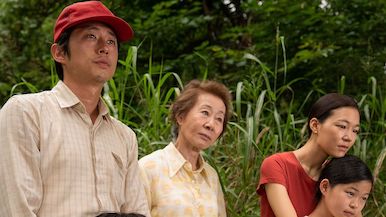The 400-Word Review: Minari
By Sean Collier
February 16, 2021
It might be because I saw the two films on consecutive days, but I think there’s a lot of “It’s a Wonderful Life” in “Minari.”
Other than small-town settings, there’s little surface-level connection between the films. But the resonance grows when considering the bones of both the new film, a semi-autobiographical drama from writer/director Lee Isaac Chung, and Frank Capra’s classic. Both choose resonant moments to tell the stories of their protagonists — not in linear progression, but rather gradually adding up to a full portrait. Both films explore the hard compromises that come with life and the pursuit of happiness in America. And neither is shy about confronting the hard fact that, one way or another, things will not quite work out as intended.
A beloved holiday favorite, and a modest modern masterpiece, created 74 years apart. Everything changes about the movies, except the stories.
In “Minari,” Chung — who impressed at Cannes in 2007 with his debut, “Munyurangabo” — revisits his own childhood as the American-born son of South Korean immigrants. Chung spent most of his childhood on a rural, southern farm; we meet the fictionalized version, David (Alan S. Kim), as his family moves to a glorified trailer on a remote, yet fertile, patch of land. His father, Jacob (Steven Yeun), dreams of making a better life by working the soil; his mother, Monica (Yeri Han), misses San Francisco, where they had both worked in a poultry processing facility — but had a community to rely on.
To improve his wife’s mood and help keep an eye on the children, Jacob arranges for Monica’s mother, Soonja (Yuh-jung Youn), to join them. Much of “Minari” remains focused on the uneasy relationship between David and Soonja; the lad initially is confused by the way his grandmother doesn’t act “like a real grandma,” referencing the cookie-baking old women he’s seen in the homes of American peers. As he grows to appreciate her more defiant, mischievous side, however, the unlikely pair become allies in a frayed household.
“Minari” makes its case — for hope, for endurance, for a much more genuine version of the American dream — quietly and plainly. Amid beautiful photography and a melancholic air, Chung does not merely explore his own past; “Minari” is a dive into the shared mythology with which we evaluate ourselves.
Much like “It’s a Wonderful Life,” come to think of it.
My Rating: 10/10




